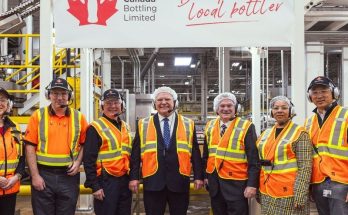Vancouver/CMEDIA: British Columbia (BC)’s reportedly ongoing support to help improve their management, delivery and water storage for agricultural purposes, farmers and communities throughout the province are becoming better equipped for drought.
“With a changing climate, drought is an ongoing concern to the success of our agricultural communities,” said Lana Popham, Minister of Agriculture and Food. “That’s why we’re continuing to help B.C.’s farmers and ranchers access water with new and improved equipment, storage facilities and other technologies that keep crops growing and producing the food we all rely on and enjoy.”
Administered by the Investment Agriculture Foundation of BC (IAF), Agriculture Water Infrastructure Program worth $100-million provides funding for projects to improve or build new water infrastructure, such as dams, dugouts and water-delivery systems.
The next round of applications for The Agriculture Water Infrastructure Program, is opening for eligible farmers and communities, to support and improve water availability, storage, efficiency and sustainability.
While benefiting stream flows and aquatic ecosystems, these projects will help support food security and production.
Almost 700 projects since 2023 have been supported by this program and the current intake will result in additional projects, such as dams and conveyance systems, and the development of community-led strategic solutions in areas where water shortage is a concern.
Applications for two streams of funding are available during this intake:
- Stream 1: (producer projects): These are farm-based upgrades to water systems and storage, including dams and conveyance systems.
- Stream 4 (strategic projects): These are community-led initiatives that focus on supporting strategic and collaborative solutions in areas with high water-use conflict, risks to the aquatic ecosystem, existing and potential risks of agricultural water shortage and/or opportunities to expand water availability.
Being underway, the project with the Douglas Lake Cattle Company is increasing the long-term water supply on its historic Gang Ranch in the Cariboo-Chilcotin.
An additional 400 hectares of land returning to agricultural production is expected by the heavy-duty construction of water-storage infrastructure.
“Thanks to funding support from the B.C. government’s Agriculture Water Infrastructure Program, we’ve been able to significantly improve our water-storage capacity in an area that is both water-scarce and drought-prone,” said Phil Braig, general manager, Douglas Lake Cattle Company. “These much-needed upgrades have allowed us to meet B.C. dam-safety regulation requirements and ensure a reliable, long-term water supply for our livestock and operations.”
Independent producers and farmers, such as Little Valley Farms, a family farm in Vanderhoof operated by Ken and Carol Fawcett with their four adult daughters, are also receiving support to upgrade their water infrastructure.
“Our operation spans generations, and with that kind of history, you want to plan for the future, which the Agriculture Water Infrastructure Program has allowed us to do, bringing sustainability to our production,” said Ken Fawcett, owner of Little Valley Farms. “In the past 20 years, we’ve experienced nine droughts, forcing us to reduce herd numbers and lose production, but with this program we’re able to take steps to improve access to water for our crops and our livestock, safeguarding our operation.”
To enable increased capacity to irrigation systems, carrying more water to farms and increasing production in an area famous for the quality of its soil, The City of Delta is planning to construct a second irrigation intake from the Fraser River and upgrading culverts along 72 Street.
“Delta is grateful for the funding from the Ministry of Agriculture and Food and the support of the IAF,” said George Harvie, mayor of Delta. “Through the Agriculture Water Infrastructure Program, we have been able to make critical upgrades to the irrigation water-conveyance system our farmers rely on. These improvements help protect crops during dry summer months, build resilience to drought and strengthen the long-term sustainability of Delta’s agricultural community.”
The current intake for applications will be open from Tuesday, Nov. 18, until Dec. 18, 2025.





